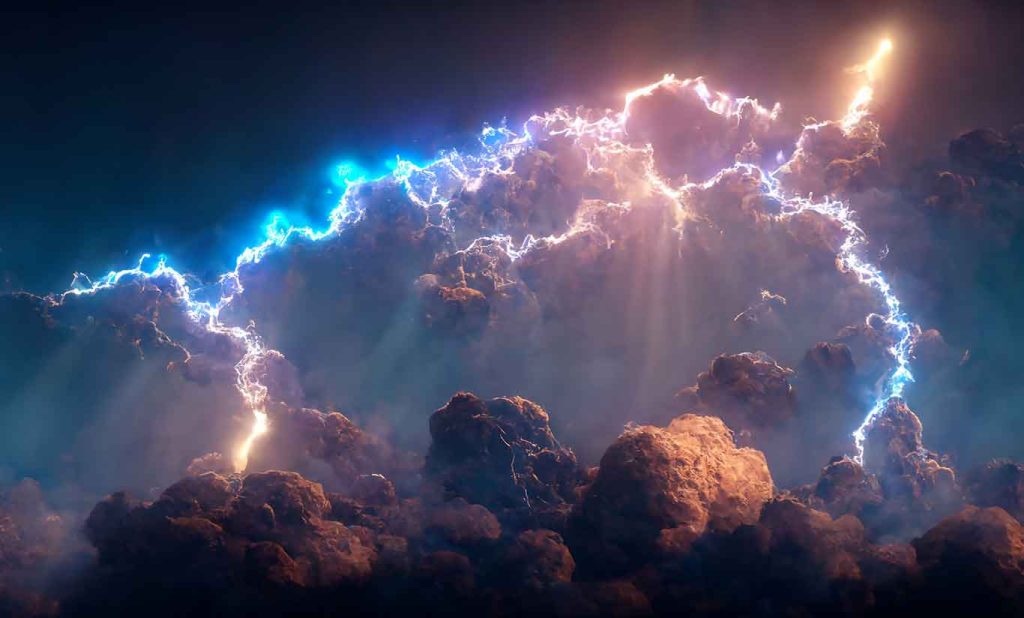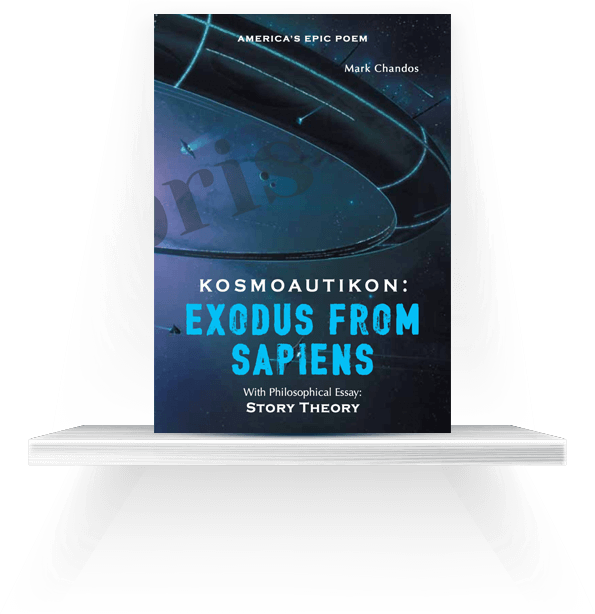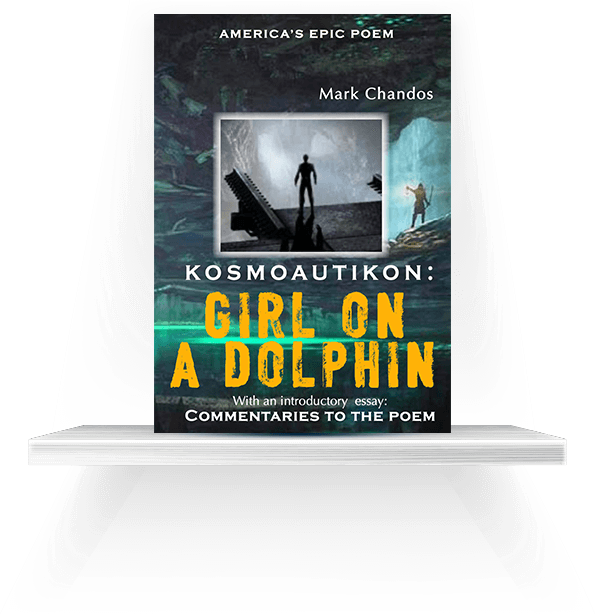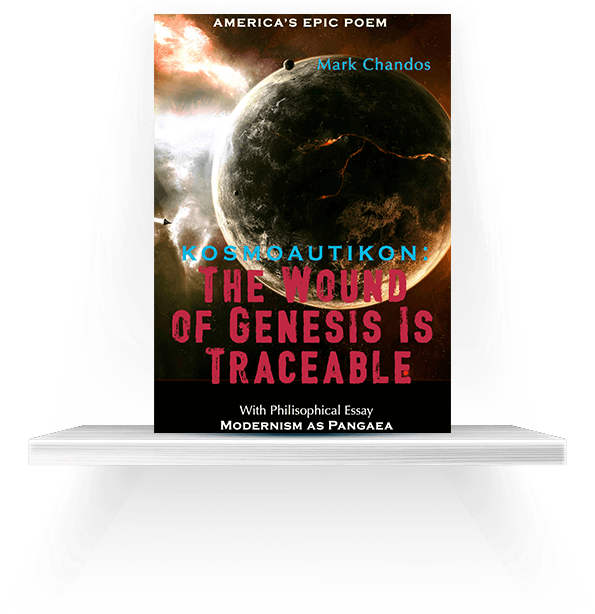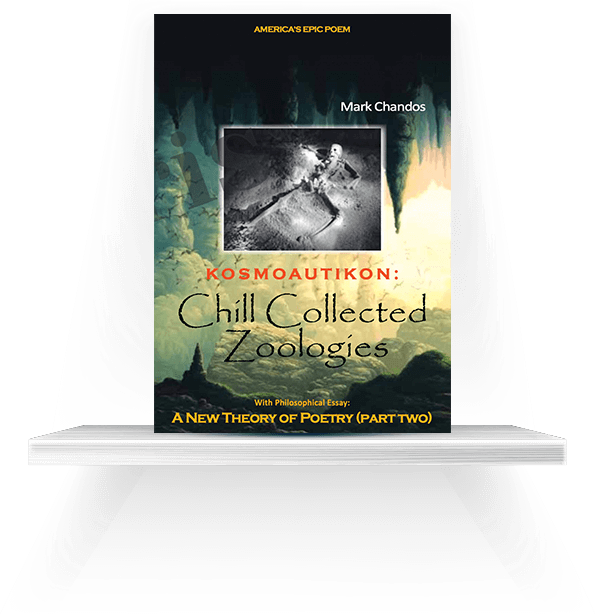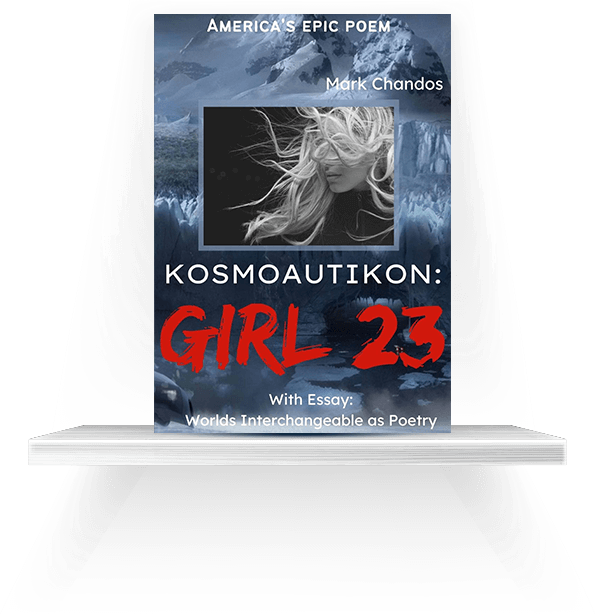When you compose a strong poem the pleasure creeps up your back…like the warm heat rising from the register in the cold morning when you were a child waking up. Do you remember that feeling?
Consciousness operates irrationally. When something is true – just by saying it – that is irrational. That’s how magic works – and everyday life of Homo sapiens. Modern society operates with charismatic forces – as seen on television and screens. This is justice since charismatic forces rule the universe – and they appear from seemingly no physical source.
When a charismatic person says do this or do that – that life is like this, or like that – they are believed with passion and certainty. What is this force? It is an irrational force. Charismatic appeal ignores the presence of a rational world – it demands an emotive appeal – appearing to other men as an unstoppable force of nature. No person, no science can predict the character of the unborn child. This is profound.
If life is not a rational and predictable science, what entity then is in control of life? Events run straight through the walls of the rational superstructure as if it did not even exist. We have to account for this force. It appears in poetry.
No one sees what is coming. All artificial veneers of science lay down before a charismatic force. Charismatic appearances (and persons) cannot be predicted or anticipated with any skills known to man. That alone tells you what you are dealing with. Poetry, likewise, is unpredictable and suddenly divergent with innovation.
The poet welcomes the irrational when something is somehow true – just by the act of saying it – that is the irrational magic of the poet. A poet is a maker of worlds – irrationally. He makes a world by speaking the world. This is the catch: He only has to find the correct magic formula – the “just-so” words – to make the image suddenly appear – emotive and informative – attractive, alluring, and solid. Since poetry is the art of the image, then metered poetry is irrational to its bones.
A poet maneuvers irrationally. He may use the rational alphabet, but it is camouflage, not essential for poetry to exist. Poetry existed before the rational alphabet and will survive after the alphabet. The West’s greatest thinkers and poets did not use the alphabet at all (as Homer, Socrates, Sappho, Milton). Prose, on the other hand, cannot exist without the alphabet. Prose depends on the authority of the alphabet culture. A manual on how to build or fix a machine has only the requirement for tactile information. Prose goes no deeper than the surface of the illusion of a physical world. The use of poems discovers eternal life and gods. The use of prose assembles machines with interchangeable (rational) parts – and sells soap.
Prose has existed only to fit a culture of rational texts. Overuse of prose, and its necessity to make machines and spread the physical illusion (in education), has allowed prose to achieve great authority in the West. But the ubiquity of prose usage has allowed men to forget the greater power of poetry – the original language of Homo sapiens. Our species was first identified as that mind that buried their dead, preparing graves for an afterlife. They discovered symbolic thought of great mystery and magic to ritualize this powerful instinct – the continuity of life – of which ordinarily there was no physical proof. When men addressed the gods and the rulers, only a formalized, ritualized poetry was fit for speech. This is how Homo sapiens originally used language. Language is, after all, only a purse of symbols.
The spread of the use of the alphabet allowed modernism to incite poets more and more to edge towards the use of rational prose. Writing poetry as newspaper prose is an act of forgetting – forgetting that poetry is irrational. Prose overlooks the irrational fact that, somehow, everything that is said is true – when spoken by a charismatic entity of music, poetry, or beauty. The use of prose is an act of willful ignorance – ignoring the magic that surrounds consciousness. The use of prose is thus an act of regression, discounting the limitless and uncanny possibilities enveloping a conscious mind.
Prose is insidious since it needs a man to believe the physical illusion is a solid, fixed data set. This limited belief boxes him in against the long count of human existence. Prose cannot operate without this belief – and so moderns are taught that physicality is a more substantial “reality,” that the material of the machine is of great value, and having a machine is more significant than having a soul. In modernism, consequently, he who has more material objects is thought to have a richer life. This is the abusive education of prose – and the rational. Prose leads men to their destruction, polluting and trashing the earth, and promising if they should only leave the safety of earth’s atmosphere, they should find great rewards on other worlds. That is nothing but a siren-call of madness. There are no men on other planets. The atom is empty. The photon is under the stipulation of a conscious mind. And, in truth, we have no pressing need to go to dead spheres existing in a void – just because we can.
Kosmoautikon, faced with the madness of modernism, is a world infused with the education of poetry – and the magical, limitless possibilities gained from the exploration of poetry. Poetry explores consciousness – the yet undiscovered idioms prescient deep inside our minds.
Poetry reestablishes the original conversation of Homo sapiens – that life extends beyond the material illusion – and that we share a mind possessing great spiritual power. Poetry teaches the truth that man is immortal, and thus only a visitor to earth. Without the fact of man possessing a soul, poetry cannot operate – since that is more of a truth than the illusion of physical matter – and poetry can only tell what is true. If a poem would attempt to tell a lie, the poem would fall flat – it would jar in the ear of Homo sapiens.
So the new focus of image culture, privileging the emotive image over rational content, is an opportunity for the poet to regain his footing in the West. If the alphabet is in chains and modernism increasingly rejects rational science in favor of emotive image culture, there can be great poets again. That is the thesis of Story Theory.
Science is exposed in the image culture as merely another school of poetry – a language of symbology – but only one of many. The discredited data-sets of science are rapidly becoming a wounded morality. Technology kills and creates mass chaos. The atom is empty and the photon is a shape-shifter under the stipulation of the observing mind. In a modern world increasingly irrational, the poet may again operate charismatically. He may construct metrical poems that no longer seem less prestigious than the prose poems of science. If the rational alphabet is in chains – so is science.
Everyone wants a new world. The reader is only reading this book because he needs a new world. Every poet, every academic, and every critic has failed to tell the truth about poetry in the 20th century. For one hundred years in the west, we have been told by scientists, “Trust us, we will think for you.” This is a problem when even a master’s degree in mathematics cannot understand or explain most advanced scientific papers. Currently, and for many generations, nearly no citizen can understand any published paper in the specialized sciences. This is intolerable as far as clarity of life is crucial for any vernacular society to be healthy. The medieval Pope’s also told us to be quiet and trust. That did not end up well.
Vernacular incomprehensibility is a fault that will destroy this civilization in its crisis.
Something is wrong not only with modern prose poetry, something is wrong with modern civilization. In modernism, each profitable institution lies, and every lie seems to be true. The irrational, thus, now goes very deep in academia. Ideological pressure keeps academics from saying the truth – since the truth would offend someone’s ideology in a balkanized society where the truth could not be said if you wanted to be published or get promoted.
The West has now only the choice of speech that is politically correct. This freezes and chills the freedom of speech – and poetry must have freedom of expression. Any scholar spending thirty years struggling to publish and obtain tenure in leftist academia simply has to be an animal of the same herd. As in the Soviet Union, no one in the West can say truthfully what is happening in society. Additionally, the fear is too great in corporations (giving grants) that someone would boycott its products – and it would lose market share. This fear gives ideology a platform.
The point is this: There is no room for truth – or poetry – in an environment of fear. This is what was wrong with the 20th century. It is a century of great fear, first from the ideological Right, then the ideological Left. Hate smothers great poetry. Poetry cannot use its language to support a political ideology. It falls flat. Ideological speech always operates as prose.
Decade after decade, I waited for a Dr. Johnson who could organize the chaos of modern literature. No one came forward. Most statements of truth and honesty could have been easily said early on – just after World War II. But no one stated them out loud. They are as follows.
First, prose is no substitute for poetry. Prose operates only as prose. No one ever admitted this most basic truth. Prose is not a substitute for poetry.
Second, poetry of the 20th century failed to carry a narrative with powerful and varied characterization. That is, modern poetry could no longer tell a story.
Third, poetry in this period was written largely by poets of a single, self-righteous, and self-indulgent ideological perspective. No one seemed to notice that academia had no ideological plurality after the 1970s. Poets and publishers generally belonged to a self-satisfied and militant ideological Left. Conservatives – that is, plurality – fled the universities in the 1970s. A remaining narrow and forbidding leftist elite, moreover, advocated no discipline and no coherence to any school of poetry – except that the genre should be without distinction. In this environment “free verse” and “free interpretation” was the only teachable methodology in institutions of education. This was not poetry, it was surrender. A poet knows what he wants you to feel and he knows what he is saying.
Forth, most poems (prose poems) since the 1960s were judged as political speech, to ensure a certain refined political tone validating the many narratives of leftist protest. By the 1990s poetry in the West became prose protest of minority demographics, gender, or identity sexuality – and the reader was dared not to fall in line. The reader was dared to say the Emperor had no close on – dared to say that modern poetry was self-indulgent – and cheered only one segment of the population.
Fifth, no one observed that the timing of the death of metrical poetry in the 1950s occurred at the very moment poetry also lost all authority and prestige in Western society.
Sixth, no critic, no poet, no academic realized the science was not, nor ever could be the final language of reality, that science was only a brilliant poetry – complete with its own linguistic symbols, data-sets, leitmotifs, and creation myths.
The present poet, therefore, will read the signs of the age – and he will no longer ask others to tell him what he needs to know.
After pilgrimage in the desert of modern “prose verse,” the future poet will understand why the school of poetry of the last century was abortive. The simple fact is this: science was a more potent school of poetry – complete with its superbly crafted images, symbols, and data-sets. The education system, funded by rational corporations, enforced the myth of the absolute existence of the physical world. This is a mistake. The atom is empty and the photon is under the stipulation of the spiritual mind of the conscious observer (man). Metered poetry corrects this misprision by enchanting the mind of Homo sapiens – irrationally. The mind of man is the center of the universe – not material spheres, Big bangs, or mindless particles.
The modernist will correctly be alarmed when so much he is so used to cheer, all that he is taught to admire in academia is an ideological data-set. Perhaps after all the modern will be amused to hear something new and not merely another cliché of modern thought. Like the earth, the modern world seems solid and all too real. In Story Theory that is an irrational illusion. To Dionysus, everything said is somehow real. That is how the mind of Homo Sapiens work. This is why poetry works – because its how our mind works.
The insight, exposed in Story Theory, that science is a school of poetry, has many implications. First, scientism is only a choice of equally potential linguistic data-sets. In this capacity, science operates as a self-referential liturgical church – in exactly the way any church is liturgical, self-referential and faithful to its original creation myth. This church is caught reversing its own decrees in each generation, doctoring data, and awarding mere laboratory technicians the status of prophets.
Second, the claim of the solidity of matter, the bedrock of physical science, no longer can be used as a foundation myth. In quantum mechanics, the wave functions of the empty atom explain nothing if not validating the agency of a spiritual and conscious mind. After eighty years of testing, we now know, the wave function collapses only on the stipulation of the mind of the observer.
Third, the language of science, so far from explaining the origin of a man’s spiritual heritage and power, is not, nor ever can be, the language of reality. Homo sapiens’ mind cannot be accounted for separately from a spiritual ontology. Matter disappears at the microscopic level and acts as a wave function – manifesting under the stipulation of a mind. (That is, at best, there is a “spiritual wave” of potential being that collapses into the illusion of matter when an observing mind is present.)
Forth, scientism, since it is a human language, is not the final language of Homo sapiens, and this contradictory civilization will be replaced as all previous human civilizations have been replaced. Moreover, reading previous history, we know the succeeding civilization will advocate with abandon completely opposite linguistic sets of reality. As Christianity could not have foreseen the rise and prestige of scientism, so scientism in-turn will never see what is coming. It will be a brave new world.
Fifth, in Story Theory, no man has ever for a second seen reality, he has only made a linguistic representation of the reality he sought. That means that language is our only house of being – and poetry is the highest form of irrational thought. Our mind, and certainly our senses, were not made to see a final reality. As such, all a man can do is to climb up into his own poem. All a man can do is believe his own belief. All a man can leave behind him is his story of life. And no man has ever achieved more than this.
Sixth, if scientism is proven in Story theory to only be a human language, science can in-turn be subsumed by a further resource to human language. This is the opportunity of the present poet and on exhibit in the poem Kosmoautikon.
Conclusion
So we think we know what happened in the miscarriage of poetry in the last century. It is an opinion we feel has lucid and coherent arguments.
In the last century, modern poetry tried (and failed) to compete with the brilliant images of a proud victorious science. Modern poetry made the mistake of competing with scientific prose with worse prose and poorer images. Losing its market and social prestige, modern “prose poetry” became, in academia, ideological political speech leveraging victimhood as its claim for the reader’s patience. The scientist had a firmer grasp of poetic charisma in the 20 th century – such a brilliant and fantastic narrative – replete with rational madness and self-contradiction. Poetry, in my generation, on the other hand, could not generate a narrative or a story.
What the modernist poet failed to see was right before his eyes. Science was only another school of human poetry – a choice of linguistic symbol-sets. Instead of intimidation, the strong early modern poet should have rejoined with a greater narrative and a charged language that rose to the level of its content. Newspaper prose and the wallowing self-indulgence of human depression was not the answer. We can be honest now. A person’s sexuality, gender, or race – or howling or placing your head in an oven – are not the measurements to define who is a strong poet. This should be clear.
Instead of disparaging for the loss of his world, or even the glorious alphabet culture of Ancient Greece, the present poet will look upon the return of the Mother Goddess as an opportunity. This, after all, is the prize he seeks: to know one true thing – to know what revolution is now occurring in Western society – only then can he see the fire beneath the smoke – and find a mooring to inform the poetry of his age.
Knowing that the loss of confidence (in the face of science) was an illusion of language, the poet may again use charismatic metrical language – allowing Western poetry to regain its permanence. He might wish to rise to the height of its previous intellectual and emotive high content. Yet excellence and power in language should never be accused of being retrograde or nostalgic. In Kosmoautikon no attempt is made to sell oil lamps to the atomic age. Metrical language has to stand on its own merits.
The strong poet will not show subservience to metrical solutions, but vary his meter as content and emotion alter. While rejecting the rigid adherence of metrical formulas (the mistake and glory of a Milton or a Johnson) he will take care his own rhythms cannot be altered or improved upon by another. Like any poet, he will choose to perform what he alone in the universe can perform.
Any close examination of the Shakespeare poet will surprise the advocates of iambic pentameter. More than a few lines had nine, eleven, or even twelve beats – and yet he did not seem to be embarrassed. The close reader will observe the greatest poet in English resorted to prose in comedic interludes and used blank verse in his most ambitious displays of power. One is amused to read how early editors, as Dr. Steevens, was constantly correcting the measures of “our great poet” by amending the poet’s work to make lines of nine and eleven beats correctly equal ten – when in fact they were not intended to be so helped. Frequently the great poet’s lines were neither iambic nor pentameter. Likewise, the present poet will choose to use meters and yet remain free to make his own innovations.
Metrical poetry has many strengths that prose does not possess. Meters enforce measured syllables, and this extra effort of mindful conciseness, in the hand of a savant, adds a charge to language that cannot be surpassed in prose. When a metrical poet hits his mark, the reader cannot detect that art and meter have been employed. True meters are invisible. Meters and “just-so” word associations ensure that no word can be taken out of the presentation without destruction of the poet’s power, intent, content, or emotion. This rigor ensures the poet’s verse is transformed into a permanent human code, reproduced nowhere else in the universe. It is the only competence unique to man and proves that humans once existed here – in such a place and in such a time – long after his civilization has fallen into dust.
In Story Theory, a poem is the most permanent monument of human thought. It is impervious to time; it cannot be altered by the prejudice of a later generation. It might be that the gardener showed great care – and still, he missed a few rows – but his bag of seed was in the ground before the rains came.

